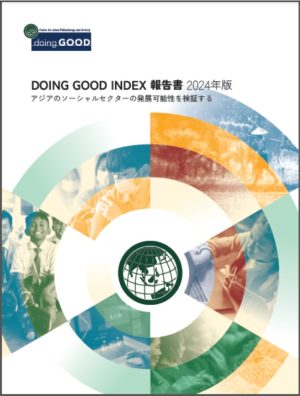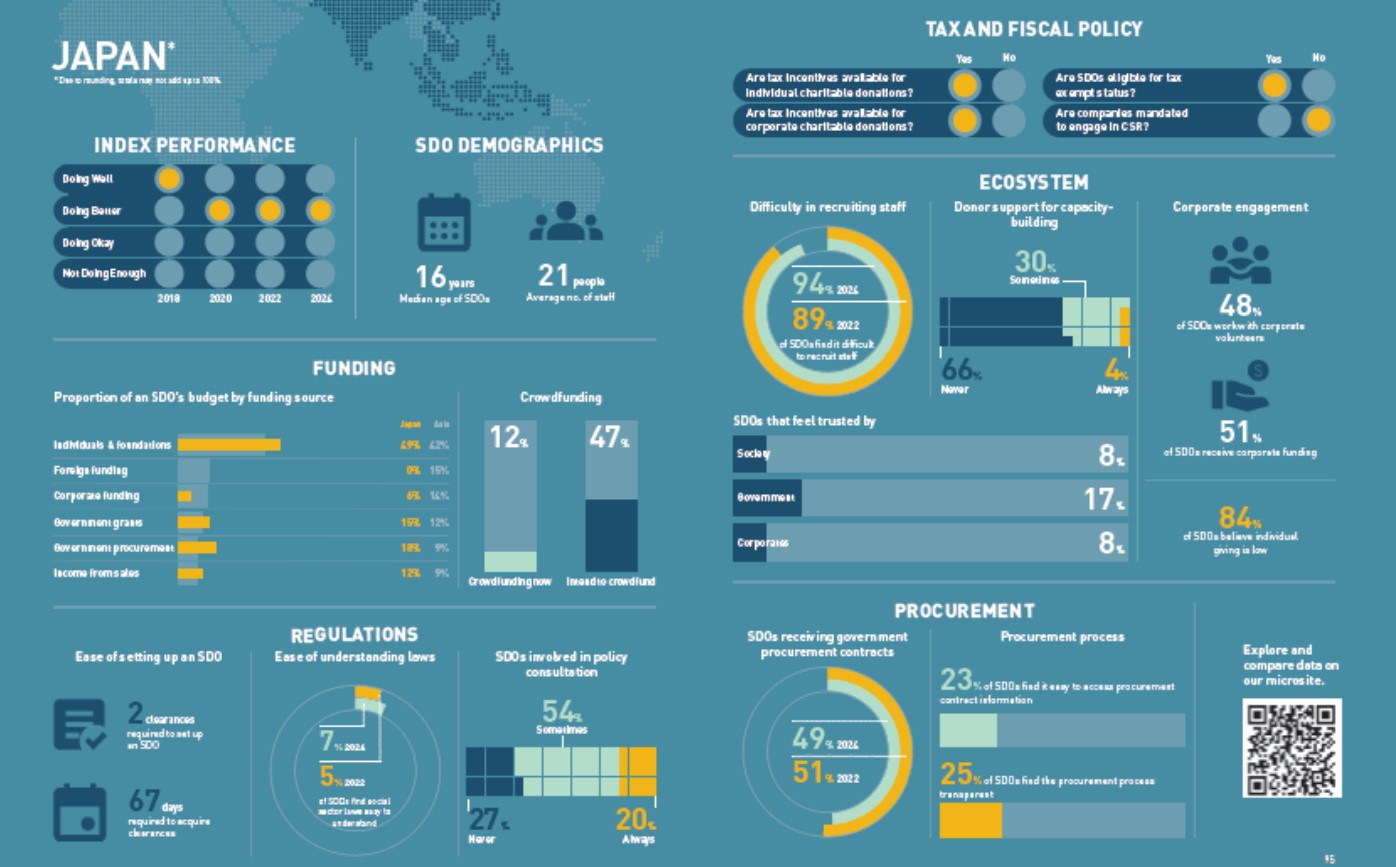JNPOC and CAPS assess the readiness of Japan’s social sector to thrive with the Doing Good Index 2024 SpecialNews
Posted on July 30, 2024

The Centre for Asian Philanthropy and Society (CAPS) and Japan NPO Center (JPNOC) assess the performance of Japan’s social sector on the Doing Good Index 2024 report, a biennial study that identifies the policies and incentives to maximize philanthropic giving and foster a thriving and effective social sector. The reports show Japan maintains its status quo as “Doing Better” on the Doing Good Index 2024, highlighting areas of strength as well as opportunities for Japan to further build its social sector.
As the Doing Good Index’s research partner organization for Japan, JNPOC has translated excerpts of the report for the Japanese audience, including the Executive Summary, Chapters 1 and 2, and Country Snapshots (Asia and Japan). The DGI2024 abridged Japanese translation report (PDF: 5.1MB) is now available for download.
Key findings from the Doing Good Index 2024:
1. The use of digital technology has become commonplace in the social sector in Asia, but social sector organizations are insufficiently prepared for the technological future
- 95% of the organizations surveyed in Asia use digital technology to carry out their work, with 88% intending to increase their use of digital technology in the next two years. 59% of the organizations said their staff lack the skills to use digital tools effectively.
- Similar to other Asian economies, social sector organizations in Japan are increasingly utilizing digital technology. 54% of surveyed organizations have increased online service delivery, and 57% have increased their use of technology in day-to-day operations.
- Access to hardware is a challenge for organizations in Japan, with 39% citing this as one of their top needs in terms of digital technology. While 86% of organizations have sufficient and reliable access to the internet, only 59% have adequate computers for their staff, lower than the Asian average (69%).
- Many organizations in Japan are also struggling to advance to the next level. While 99% use basic software, such as Microsoft Office or Google Workspace, this figure drops when it comes to advanced software (37%).
- Cybersecurity needs to be an increasing priority for Japan’s social sector. 75% of organizations do not have a cybersecurity plan or are unaware of one, similar to the Asia average (70%).
2. Governments continue to send mixed messages on social sector regulations
- Japan has a quick and efficient nonprofit registration process. On average, it only requires two clearances, obtained within 67 days. This is compared to the Asia average of three clearances and 123 days.
- Laws are relatively difficult to understand, and views about their enforcement are mixed. 71% of organizations in Japan say it is difficult to understand social sector laws, compared to the Asia average of 55%. In addition, only 53% of surveyed organizations think social sector laws are enforced, below the regional average of 63%.
3. Funding to the social sector has remained mostly unchanged
- Funding from domestic sources—individuals, foundations, and companies—remains the most important source of funding, making up 49%, by proportion, of an organization’s budget, compared to the Asia average of 42%.
- Nevertheless, the majority of community organizations in Japan (84%) believe that the level of domestic funding is low.
4. Recruitment remains a key challenge for social sector organizations across Asia
- In Japan, 94% of social sector organizations say that it is difficult to recruit staff, much higher than the Asia average of 73% and the highest figure in Asia.
- 80% of social sector organizations in Japan believe there is a public perception that nonprofit staff should earn less than their for-profit counterparts, compared to the 69% Asia average.
- Only 4% of organizations in Japan are able to get consistent donor support for capacity building, well below the 15% Asia average. In fact, 66% of SDOs in Japan say they never receive donor support for capacity building, the highest in Asia.
5. Companies are engaged but there is room to do more
- In Japan, 51% of community organizations receive corporate funding, similar to the Asian average of 56%. However, this only makes up 6% of their budget.
- 48% of social sector organizations in Japan work with corporate volunteers, lagging behind the Asia average of 63%.
- Japan is 1 of 10 economies surveyed where ESG reporting is either required or highly encouraged as a listing rule on the stock exchanged.
6. The role of social sector organizations remains important
- 47% and 49% of organizations report that the number of beneficiaries they reach and demand for their services has increased, respectively, in the past 12 months.
- Trust, however, remains a pressing issue. Only 8% of social sector organizations in Japan feel trusted by society, compared to the Asia average of 44%. Similarly, only 17% of organizations feel trusted by the government, compared to 36% in Asia.
 Japan Snapshot from Doing Good Index 2024
Japan Snapshot from Doing Good Index 2024
Recent Articles
- Towards a society where children want to embrace life
- The Evolution of Philanthropy: Five approaches shaping contemporary practice
- 25 years of community understanding and moms’ hard work: The activities of Kinutama Play Village
- Connecting memories: Courage found at the film screening of parents’ legal battle after the Great East Japan Earthquake Tsunami
- An NPO project I came across while reflecting on teacher shortages after leaving my teaching job
- To unlock philanthropy’s potential for Japan, we need to understand its meaning